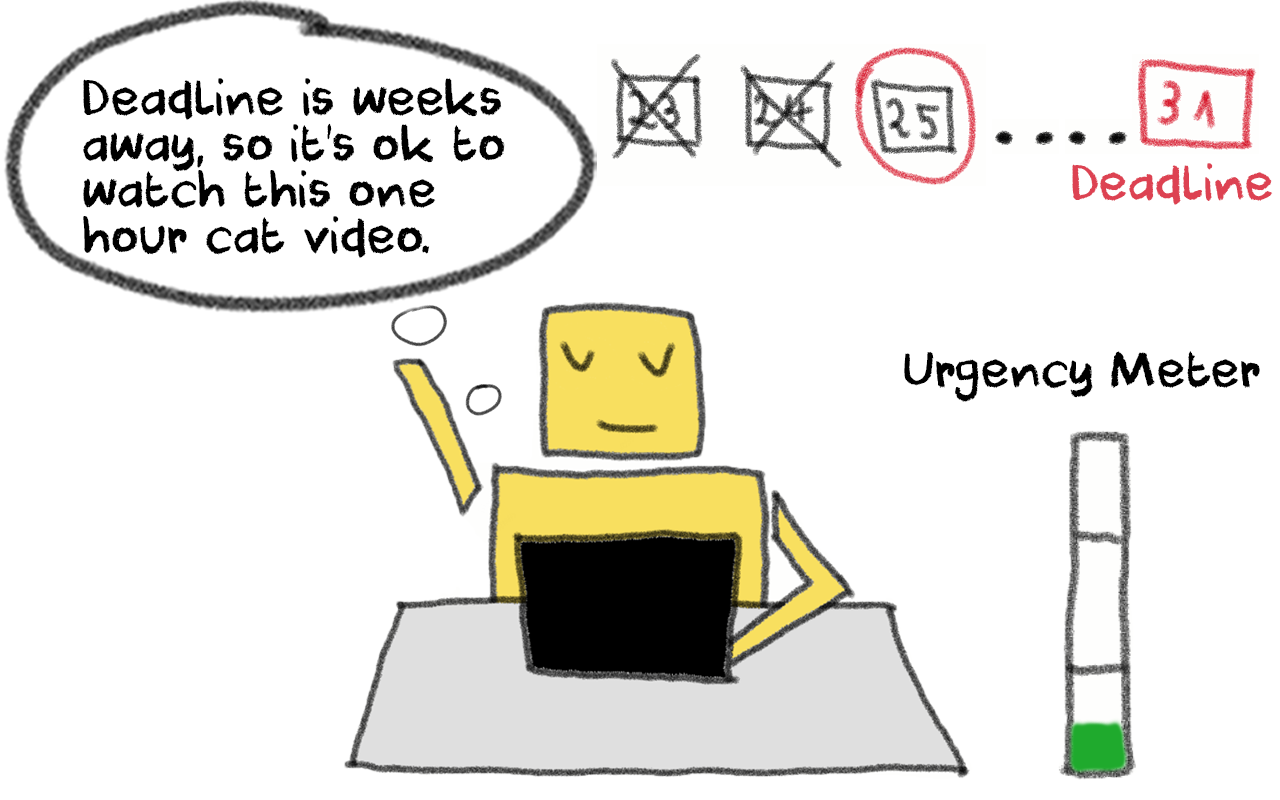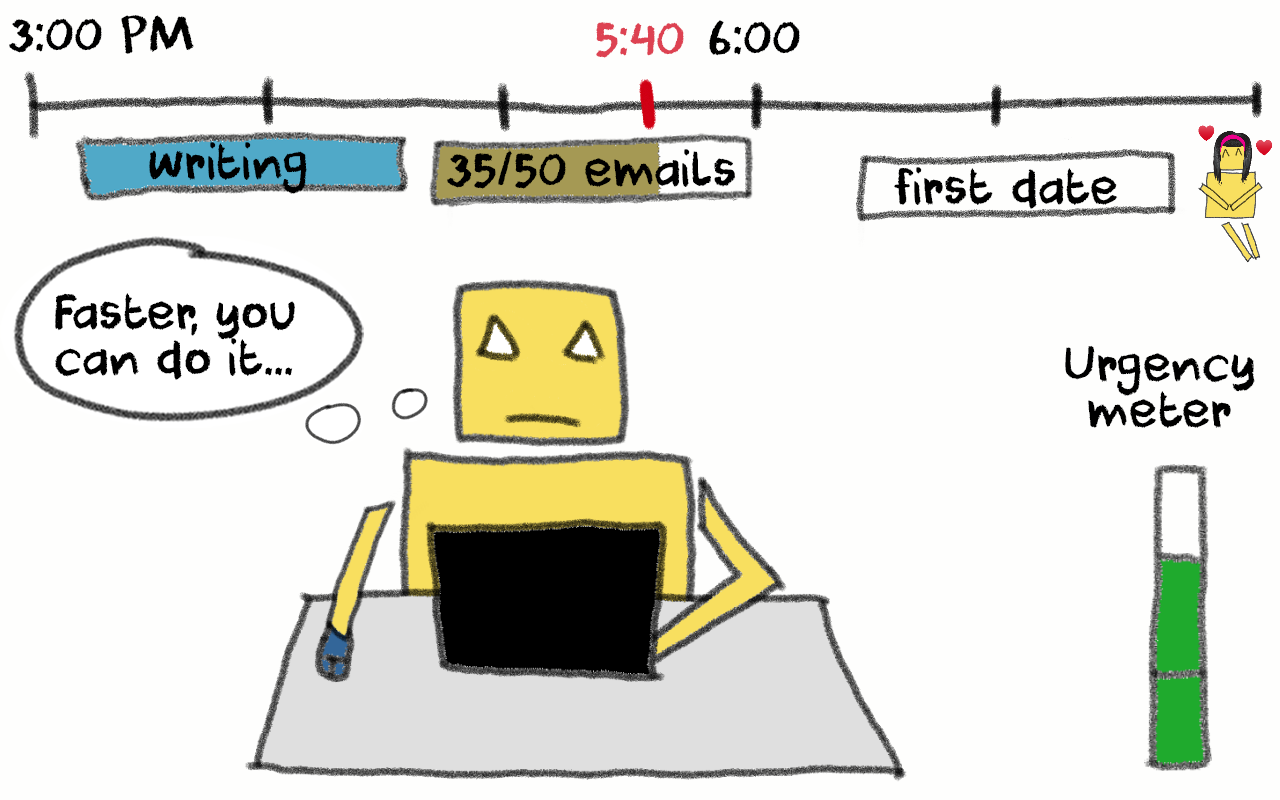Ever had to do a task that had a long deadline, but you couldn’t muster the will to complete it until 0.2 seconds before it was due?
Of course you did. At least once. You wouldn’t be human otherwise.
However, you might have noticed that even if the deadline was shorter, you still would have been able to complete it on time. Why’s that?
At first glance, you might say: “Procrastination, duh!” But here’s an alternative explanation that won’t make you feel as bad.
To put it in two words, the phenomenon is called Parkinson’s law, which states that “work expands so as to fill the time required for its completion.”
The first person to observe and write about this extensively was Cyril Parkinson, a British naval historian and public administration specialist. He noticed that the more time bureaucrats were given for a task, the longer it took them complete it. Shorten the allocated time, and things moved quickly again.
Related: 3 Mind Tricks to Make You More Productive
Parkinson’s Law, Laziness and Procrastination
We procrastinate for a wide variety of reasons, such as fear or simply laziness.
However, there’s also an evolutionary motivation behind laziness. Our ancestors lived in a world where food sources were nowhere near as plentiful as today. As such, they conserved energy for the times when they entered survival mode: hunting, foraging, exploration, building and so on.
If an ancestor of ours wasted his energy on useless tasks, he wouldn’t be able to cope with the hardships of food gathering. So, in a counterintuitive evolutionary twist, laziness has proven to be an important trait in keeping our species alive.
Which brings us back to Parkinson’s law. Our biology urges us not to spend energy on a task that isn’t yet important to our survival. So we postpone, delay, avoid, create excuses and so on.
But then, the deadline comes, pulls you out of idleness and gives you a sense of urgency. Deep down, you know that missing the deadline is bad for your survival, because it can cost you your work reputation, or in some cases even your job, money, valuable assets, friendships, relationships and so on.
This fear pushes you to do an all-nighter to finish a project, or work mad overtime hours.
As you can guess by now, the whole point of using Parkinson’s law is to send you into a mild survival mode where you actually get stuff done, without lazing about (too much).
Related: 13 Undeniable Ways to Get Sh*t Done
How to Use Parkinson’s Law
1. Get used to setting deadlines.
Giving yourself time constraints will force you to restructure work tasks so they can fit into the schedule.
More complex projects and tasks with a distant deadline lull you into this false sense of security. The work should be done now, but not now, now.

In cases such as this, breaking down the main task down into smaller bits, and assigning a deadline for each, will bring them closer to the time horizon, and gives you a sense of urgency that motivates you to complete it.
But deadlines can also help you work less. Or at least, spend less of your time at the office. It’s easy to treat the 5 or 6 p.m. threshold as more of a guideline than a rule, and work past it in order to finish tasks you postponed throughout the day.
Thing is, you almost always know when postponing the task will keep you overtime, and yet you are fine with it. That’s because you don’t feel you lose anything by staying longer at office, which brings us to the next point.
2. What do you lose if you don’t respect the deadline?
The easiest way to make yourself respect a time limit is to give yourself something to lose if you don’t stick to it. Think about what you are missing out on by lingering at the office.
If you came home earlier, you could watch a movie with your lover, relax in the kitchen and cook your favorite dish, or work on that side project of yours. Instead, you’re wasting all these opportunities by doing last-minute work you could have done earlier in the day.
A good way to keep yourself to a time constraint is to schedule something else right after the deadline you set for it. For instance, if you want to be sure you’ll finish sending a bunch of emails by 6 p.m., schedule a date at 6:30 or 7:00. By now, you have real skin in the game to stick to your target, and to not laze around.

3. Learn how to create reasonable deadlines.
There are really only two reasons why you might want to use Parkinson’s law:
- Cut down on lost hours in which you could do something else.
- Stop feeling guilty and stressed about wasting time.
However, when first applying the rule, you might feel overzealous and set yourself impossibly tight deadlines in an effort to work faster.
This doesn’t work. Instead, you’ll just end up giving yourself even more stress as you rush to meet the time limit. Not only that, but the quality of the work goes down, too.
The point of the deadline isn’t to enter a competition with the clock, but to cut down on stress and wasted time.
This is one takeaway from a study by Dan Ariely, a renowned behavioral economics professor. His experiment involved groups of students submitting three papers over the course of a semester.
- The “free choice” group could choose their own paper submission deadlines.
- The control group, however, had to hand in their papers at a time set by the professor.
Compared to the third control group, the “free choice” students enjoyed their task less, and their papers also had more errors.
The end conclusion of the study was that while self-imposed deadlines are effective, people have difficulty properly optimizing them.
The point of the deadline isn’t to enter a competition with the clock, but to cut down on stress and wasted time. If a task realistically requires six hours of work, don’t try to do it in five. If you can complete it in seven hours, it’s awesome. That extra hour isn’t wasted time, but a buffer period for unexpected events such as an urgent phone call, a loss of concentration or even just a short period of relaxation.
Parkinson’s law can help you cut down on some of the wasted time and stress of your life, and in some cases, help you do more things than you thought possible.
To wrap things up, keep the following in mind whenever applying the law:
- Always have a deadline.
- What do you lose if you can’t keep the deadline?
- Is the deadline realistic? If not, try to figure out the accurate one.
And one other thing: Be gentle with yourself, and always see the time limit as a tool to help you out, but not as a race.








